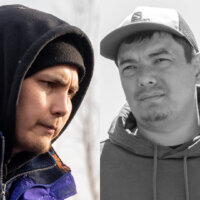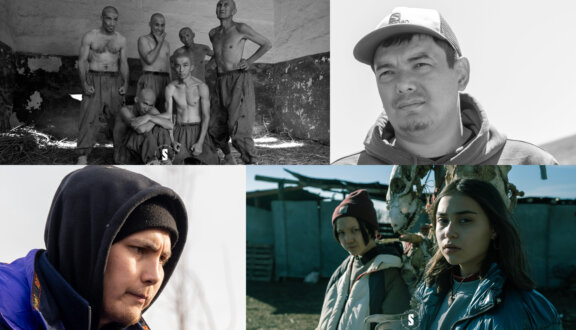We are really happy to have two amazing series from Kazakhstan in our program. In 1286 the gentle surgeon Aman gets abducted and ends up in a fascist-like labor camp. The black-and-white surreal series reminds of Tarkovsky and Lynch. Quite differently is Arhan, the second Kazakhstanian series. A horror story about two teenagers that spend a few days with their estranged grandparents in the countryside, but discover that their Grandmother is possessed by Arkhan, a demon who feeds on people's fears and souls. We got the chance to have an interview with the creators of both series. Alisher Utev is the creator of 1286 and Yergazy Begilitov directed Arhan.


Alisher Utev: The idea for 1286 came to me while I was researching Kazakhstan in the 1990s for my previous series, 5:32, which revolved around serial killers. In 1991 Kazakhstan emerged from the Soviet Union, and I learned that in the first decade of independence, our country had many ‘Achilles’ heels’, and the one that stood out the most for me was forced labor. After finishing 5:32, I’ve decided to dedicate my new series to this subject and make it the second installment of the so-called The Injustice Trilogy, a trilogy of series that won’t be narratively connected, but all will deal with themes of injustice.
Seriencamp: "Like Aleksei German, Andreij Tarkovski and David Lynch banded together to do a series" - that's what my colleague, the journalist Chrsitopher Buechele, wrote about 1286 when he first saw it. What were the touching points for the unique visual style?

Alisher Utev: I’m flattered that my visual style is compared to these legendary directors. However, I rarely use visual references from different movies or series when working on a project. My filmmaking motto is: “The content dictates the form”. So it was a vicious and hopeless story of 1286 that dictated the visual style of the series.
Seriencamp: The story of ARHAN is deeply rooted in local traditions and culture - is this based on an actual legend or myth?

Yergazy Begilikov: ARHAN is based on Turkic mythology of the Tengrism era. We tried to accurately explain the hierarchy of the Ancient Gods, Aruakhs (The Spirits of the Ancestors) and Shaitans (The Evil Spirits). Still, we’ve also mixed it with Kazakh national traditions and our cultural code.
Seriencamp: Are there any big horror or mystery movies that influenced your career or that you really like?

Yergazy Begilikov: I really like Fritz Lang’s 1921 silent film Der müde Tod, inspired by the Hindu legend of Savitri and Satyavan. This film is about a young woman who tries to save her dead husband by entering into a bargain with Death himself. I like it when, by using a horror or thriller genre as a setting, the filmmaker tells the story about the protagonist’s inner pain or when the filmmaker asks big questions about life.
Seriencamp: What is the project that you would love to do if you had an unlimited budget? What would it be about?

Alisher Utev: This is a tough question because I am now so used to the guerrilla style of filmmaking with its limited budgets and other limitations, my brain is always hotwired to try to make diamonds from coal. I guess I could make a space opera or a historical epic, but I currently don’t have a specific big-budget dream project. I prefer to work in the realism genre for now.
Yergazy Begilikov: I would like to do a multiverse story in the fantasy or detective genre. I want to make something that could enlighten the viewer and honestly say something about the nature of human relationships, which no one has ever told in the screen media format.
Seriencamp: What do you think are the greatest strengths of Kazakh series and storytelling?

Alisher Utev: There is currently a lot of new blood in Kazakh storytelling. Young open-minded filmmakers have unique perspectives on life, so they depart from the traditional Soviet school of cinema and explore storytelling possibilities while trying to carve a new path for themselves.
Yergazy Begilikov: Kazakh people have a wonderful spirit, and we experienced a lot throughout our history. Because of that, we have many things to say, so people should be ready to listen to us.
